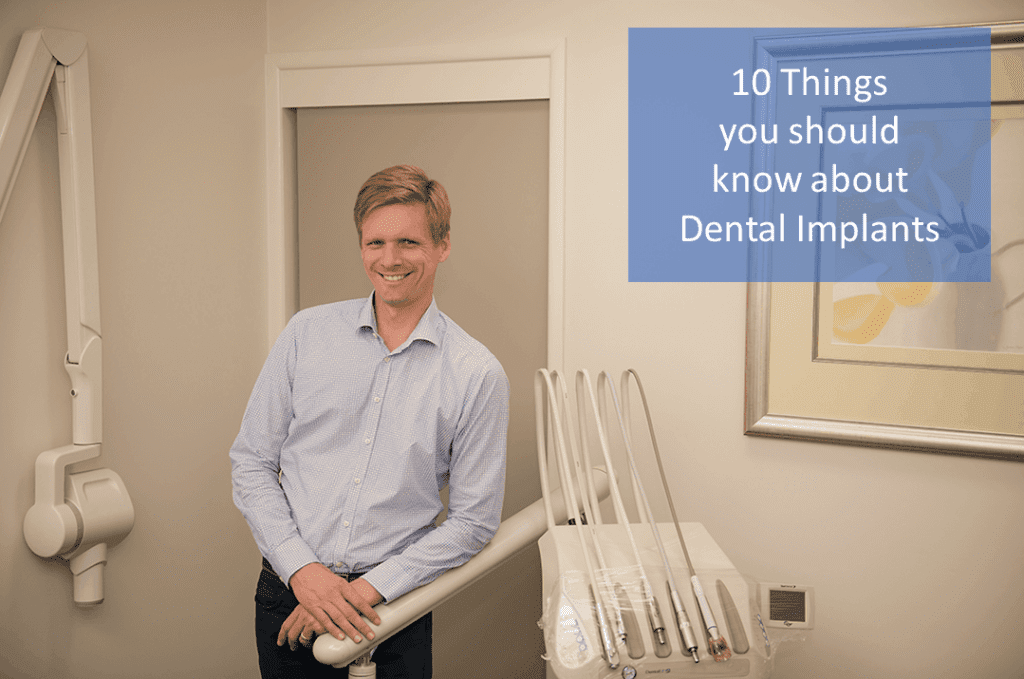
- Harris Dental Boutique
- June 15, 2017
- 11:12 pm
- No Comments
- Dental Implants
Top Ten things you should know before getting
Dental Implants done.
Dr Linc at Harris Dental Boutique shares his top ten…
Dental Implants really are a wonderful way to replace missing or failing teeth. However as dentists work with them for longer (15 years in my case) they become much more cautious, careful, and generally slower with their treatments.
Here are the top ten reasons why you should be cautious when getting implants. It’s not just carpentry. 🙂
1. How long has the dentist been doing dental implants?
Most dentists are very enthusiastic when they first start doing implants. After about seven years or so, they find many of their early cases are having a lot of problems and they become much more cautious. Inexperienced practitioners are more likely to tell you there is an easy, quick, cheaper solution. More experienced ones tend to spend more time building the mouth structure up to give more robust support to the implants.
2. Dental Implants Fail.
Most people know that a small percentage of implants don’t work in the short term. What most people don’t know is that a large percentage of implants will need to be removed or replaced in the long term. Like any other artificial body part, implants wear out. Replacing a tooth is generally easier than replacing and implant, which is why the trend world wide is towards keeping teeth as long as possible and only placing implants when there is no alternative.
3. 98% Success is unrealistic
The term used in dentistry is “survival”. Survival really only means that the implant is still in the patient. An implant can have infection, be causing the patient pain, have chipped porcelain yet if it is still in the patient’s jaw, it is considered surviving. Surviving does not mean successful or healthy. It is also usually only measuring implants at a few months after placement.
In reality, when you read studies and include all the complications that can occur at say ten years, often complication rates reach more than 50%.
4. Gums are the Issue.
Almost all leading experts in implantology now agree that thick, dense, stable gum tissue is crucial for long term success. Gums that are not thick, stable and dense allow bacteria to leak in around the implant leading to more rapid recession, bone loss and infection. Thick tissue helps prevent this and recession, which causes the implant to become exposed. Exposed implants are not always a big health problem, but it doesn’t look very good to see grey metal in the smile. Often to get thick stable gum tissue requires gum grafting.
5. Bone needs to be Thick.
Around both teeth and implants, bone needs to be thick. Thin bone leads to resorption or shrinkage which in turn leads to recession of the gum. It’s been shown that if the bone is too thin around an implant, the blood supply is quite poor and it’s likely the bone will disappear over time. In general, you want more than 2mm of bone around the implant on all sides. This often means a bone graft is necessary for a long term result.
6. Bone and gum grafting is harder than dental implant surgery.
The technical skill required to do a bone or soft tissue graft is much higher than placing an implant. Often getting a good result means taking time to build up the jaw bone and gum tissues, and then leaving it for months to stabilise. Rushing the process increases the risk of infection or failure of the graft.
7. Cost of maintenance should be considered
For a particular patient, the cost of maintenance should be considered. I had a patient that had all on four implants done in the upper and lower in Thailand. Not only was it not much cheaper than here, but they had not discussed the cost of maintenance with the patient. The patient did not realise it can cost up to $1000 or more to remove a fixed set of implant teeth for cleaning and possibly up to $2000 to remove them and repair them if broken.
Some people are much more high risk for this than others.
In cases of particularly high risk patients, it may be best to choose a set of clip in teeth rather than teeth that are fixed, so it’s cheaper and less traumatic to remove and repair. In some cases it might be worth having a set of spare teeth.
You should always be informed how much repairs will cost. Don’t be satisfied with guarantees. Most dental problems tend to pop up about five to six years after placement, which just happens to be about how long the warranty’s or guarantees last.
8. Smoking and gum disease.
Neither gum disease nor smoking rule out the use of implants. But the two together can cause very rapid loss of bone around implants (as much as 50% in a few years in some cases I’ve seen).
9. How much bone will be cut off?
Some very popular procedures involve removing a lot of bone to make them easier. This is sometimes the case with All on Four. Whilst it makes the immediate surgery go more easily, it can give the patient very limited long term options.
In a case with a lot of bone removal, it may make doing a second surgery more difficult or even impossible when the first set of implants fail. It can also mean the patient cannot even wear a denture if the implants all fail and they have to go back to standard dentures.
In general, preserving jaw bone makes cases more difficult, more time consuming, and often a bit more expensive, but it means you get more chances to have things repaired or replaced in your life time.
10. Dental Implant failures can be impossible to fix.
When implants fail, the often cause a lot of destruction to the surrounding bone and gum tissue. In some cases in the front of the mouth, this can cause problems that are impossible to fix. It is important to have a careful discussion with your dentist about how something could go wrong, and what might be the outcome.
Your dentist will address all these areas when prescribing implant therapy. To consider all the factors carefully and make sure you understand everything takes some time.
If you don’t feel it has been described to you carefully, or you were told that implants were magical things that never fail, are easy, cheap, painless, and always work, you should consider getting a second opinion.
Remember your mouth is not like renovating the kitchen. You can always move house if the kitchen looks terrible. But you can’t buy another mouth if yours is badly damaged.





